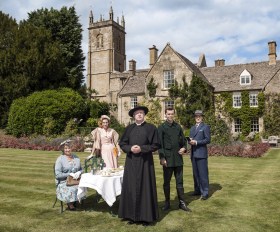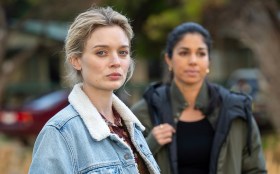My Brother the Devil dissects the constitution of communities that spring up in the shadows of towering apartment blocks.
The social machinations of tenement living have become part of the fabric of British filmmaking, with many of the nation’s features delving into the ramifications of life spent in the shadows of towering apartment blocks. The multi-award-winning My Brother the Devil joins the ranks of recent efforts Fish Tank and Ill Manors in dissecting the constitution of communities that spring up in such close surroundings, yet debut writer/director Sally El Hosaini never merely retraces familiar territory.
Her basic premise of sibling rivalry and cultural conflict is far from new – and at first glance, neither is the dynamic between her lead characters. 14-year-old Mohammed (Fady Elsayed, Twenty8k) idolises his older brother Rashid (James Floyd, The Reluctant Infidel) to the point of envy and imitation, even as their travels take dissimilar trajectories. The quiet and studious Mo craves acceptance by Rash’s drug-dealing gang friends; Rash tires of crime, violence and vengeance, desiring a living less dangerous and more honest. The film’s title alludes to the division between them, but the details are far from simple or straightforward.
What commences as an acute and astute good brother/bad brother scenario within the context of Egyptian-born British immigrants proves more complicated than the former falling sway to the influence of the latter, or righteousness prevailing over evil when the situation is reversed. Instead, the film probes the bonds of brotherhood within families of blood and affiliation, pondering the outcome when a valued figure – whether for their leadership, loyalty or potential – embarks on a path of opposition to all that they know. The consideration of identity, sexuality, race, religion, politics and prejudice further informs the journey.
Anchoring the narrative in authenticity and emotion, relative newcomers Elsayed and Floyd excel in adversarial roles, each fleshing out characters that could have easily devolved into caricatures. El Hosaini’s nuanced script lays the groundwork for the subversion of the usual street hood tropes, whilst remaining unafraid of using convention to its advantage; however, it is the fragility and complexity of the central portrayals that gets to the contemplative film’s core.
Stylistic choices also prove refreshing in their deviation from the norm, with skilled first-time feature cinematographer David Raedeker rendering the usual locales – largely comprised of unremarkable concrete constructions – with crispness and clarity that belies their underlying grittiness. Indeed, the aesthetics of My Brother the Devil typify the end product, with the film crafting the expected into the unlikely, and breathing life and depth into an oft-seen subset of combined urban crime dramas and coming of age tales.
Rating: 4
My Brother the Devil
Director: Sally El Hosaini
UK, 2012, 111 mins
Rated: MA
Human Rights Arts and Film Festival
Melbourne: 9 – 23 May
Canberra: 3 – 5 June
Brisbane: 4 – 6 June
Perth: 4 – 6 June
Alice Springs: 31 May – 2 June
Sydney: 28 – 30 May
Actors:
Director:
Format:
Country:
Release:





